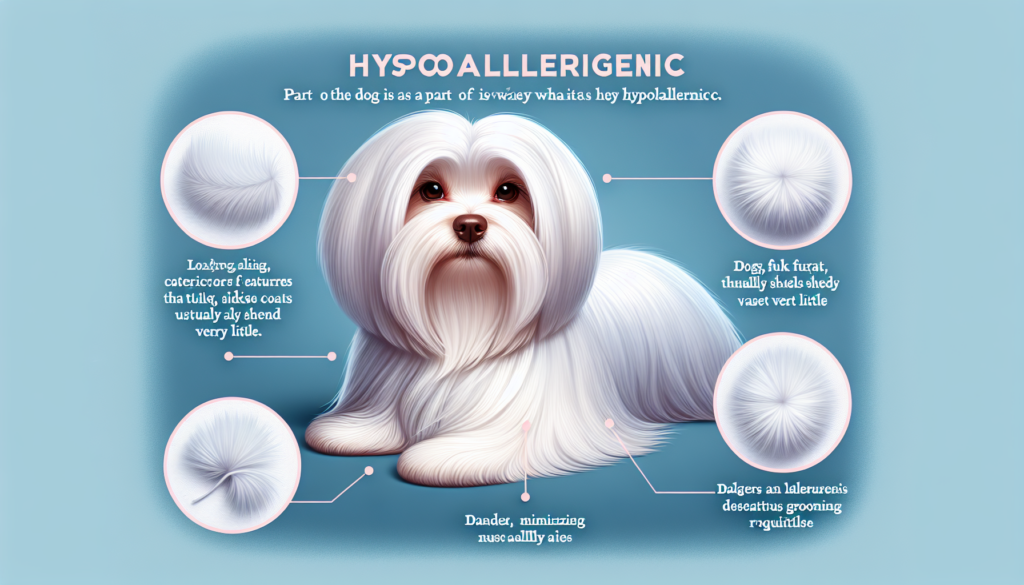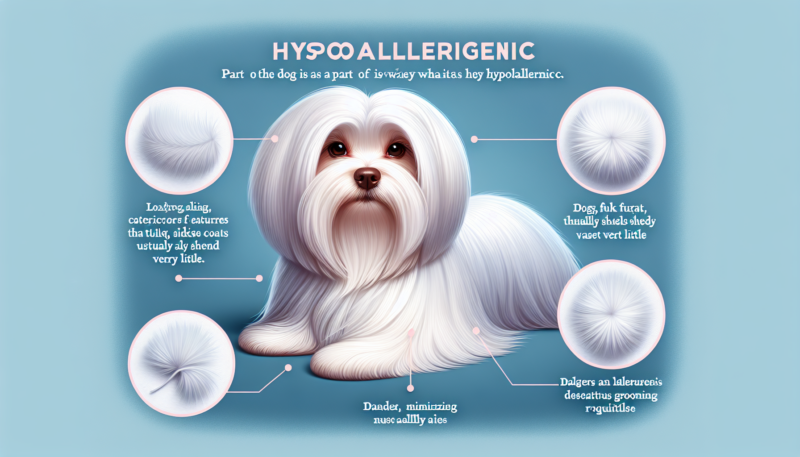Imagine having a furry friend who won’t leave you sneezing and scratching due to allergies. That’s where the question of whether a Maltese is hypoallergenic arises. You’ve probably heard about the Maltese breed’s elegance and charm, but are they truly suitable for those with allergies? This article aims to uncover the truth behind the hypoallergenic nature of Maltese dogs, providing insights into their hypoallergenic qualities and whether they could be the perfect addition to your allergy-sensitive household.
Is a Maltese hypoallergenic?
What Does Hypoallergenic Mean?
When considering adopting a dog, finding a breed that is hypoallergenic may be of utmost importance to you. But what exactly does it mean for a dog to be hypoallergenic? Simply put, hypoallergenic refers to a dog breed that is less likely to cause an allergic reaction in individuals who suffer from allergies. While no dog breed can be completely hypoallergenic, some breeds are known to produce fewer allergens than others, making them a better choice for allergy sufferers.
Dander Allergies
One of the main culprits behind allergies in humans is pet dander. Dander consists of tiny flecks of skin shed by animals, including dogs like the Maltese. These microscopic skin particles can trigger allergic reactions in sensitive individuals. Symptoms of dander allergies can include sneezing, coughing, itchy eyes, and respiratory issues. Therefore, it is essential to understand the relationship between pet dander and hypoallergenic dog breeds like the Maltese.

Understanding Allergens
Allergens are substances that can provoke an allergic response in allergic individuals. In the case of dogs, allergens are often found in the saliva, urine, and dander of the animal. When it comes to the Maltese breed, their dander is the primary allergen of concern. The Maltese is a small dog with a long, silky coat, leading some to believe that they are hypoallergenic because they do not shed as much as other breeds. However, shedding is not the only factor to consider when determining allergenicity.
The Maltese Breed
The Maltese is a delightful breed known for its small size, playful nature, and beautiful white coat. They are highly affectionate and make excellent companions for individuals and families alike. With their adorable button noses and expressive eyes, it’s no wonder the Maltese has captured the hearts of dog lovers around the world. But are they hypoallergenic? Let’s dive deeper into the intricacies of the Maltese breed and its potential impact on allergies.

Hair vs. Dander
One common misconception about hypoallergenic dog breeds is the belief that it is the hair itself that causes allergies. In reality, it is the dander, or microscopic skin particles, that dogs shed, which can trigger allergic reactions. While the Maltese does have hair rather than fur, their skin and dander are still present. Thus, even though they do not shed as much as other breeds, there is still a possibility that they may cause allergic reactions in sensitive individuals.
The Myth of Hypoallergenic Breeds
It is essential to debunk the myth that certain dog breeds, including the Maltese, are completely hypoallergenic. While some breeds are considered less allergenic due to their minimal shedding and dander production, no dog breed is entirely allergen-free. Therefore, it is crucial to understand that individuals with severe allergies may still experience symptoms when exposed to a Maltese or any other dog breed, regardless of its hypoallergenic reputation.
Factors that Affect Allergenicity
Several factors can influence the allergenicity of a dog breed, including genetics, individual sensitivity, and the extent of exposure. While the Maltese breed may be considered less allergenic than some other breeds, allergic reactions can still occur. It is important to note that each person’s sensitivity to allergens varies, and what may cause a severe reaction in one individual may be well-tolerated by another. Therefore, it is crucial to spend time with a Maltese or any potential pet before making a final decision if you have allergies.
Tips for Managing Allergies with a Maltese
If you have allergies but are determined to have a Maltese as your beloved pet, there are several steps you can take to manage your symptoms effectively:
-
Regular grooming: Regular grooming can help reduce the amount of dander present on your Maltese’s coat.
-
Frequent bathing: Bathing your Maltese regularly can help wash away allergens, including dander and pollen, that may be trapped in their coat.
-
Keep the living environment clean: Vacuuming regularly, using air purifiers, and keeping your home free from dust and pet dander can significantly reduce allergen exposure.
-
Limit contact with the dog: While it may be difficult, especially if you have a strong bond with your Maltese, limiting direct contact with the dog, especially in bedrooms and other allergy-sensitive areas, can help mitigate allergic reactions.
Other Hypoallergenic Breeds
If you find that living with a Maltese exacerbates your allergies, there are other dog breeds widely considered to be hypoallergenic that may be a better fit for you. Some popular hypoallergenic breeds include the Bichon Frise, Portuguese Water Dog, and Yorkshire Terrier. Before making a decision, spend time with each breed to gauge your allergic reactions and consult with a reputable breeder or allergist for personalized advice.
Conclusion
In conclusion, while no breed can be entirely hypoallergenic, the Maltese breed is often considered less allergenic due to their minimal shedding. However, it is important to remember that dander, not hair, is the main culprit behind allergies in dogs. Therefore, if you have allergies and are considering a Maltese as your pet, it is crucial to spend time with the breed and take necessary steps to manage your allergies effectively. Always consult with a professional for personalized advice, and remember, the joy and companionship a dog can bring may outweigh the challenges of managing allergies.
